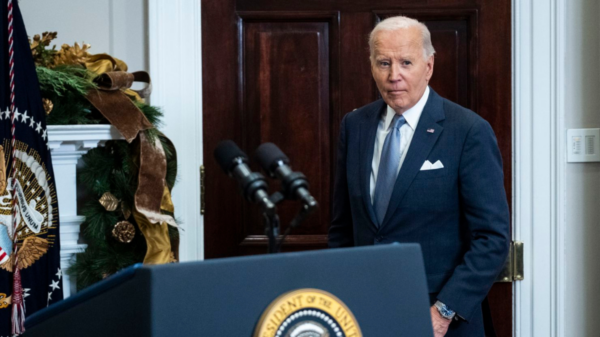Photo courtesy: Atef Safadi/Pool via AP
JERUSALEM (Fwrd Axis) — President Joe Biden declined to say if he would bring up the murder of journalist Jamal Khashoggi when he meets with leaders in Saudi Arabia this week, saying he “always” brings up human rights.
Speaking at a press conference with Israeli Prime Minister Yair Lapid, Biden was asked if he would bring up Khashoggi during his meeting with Saudi leaders on Friday.
“My views on Khashoggi have been made absolutely, positively clear and I have never been quiet about asking about human rights,” he said in response to a question from Reuters reporter Steve Holland. “The reason I’m going to Saudi Arabia is to promote U.S. interests in a way that I think we have an opportunity to reassert our influence in the Middle East.”
“There are so many issues at stake, I want to make sure that we can continue to lead in the region and not create a vacuum — vacuum that is filled by both Russia and China,” he said.
Biden will travel to Jeddah, Saudi Arabia, on Friday, holding meetings with Saudi King Salman and his advisers, including Crown Prince Mohammed bin Salman. The United States concluded that the crown prince ordered the murder and dismemberment of Khashoggi, a Washington Post contributing columnist, in 2018.
When Biden was a candidate, he condemned Khashoggi’s murder, vowing on the campaign trail to make Saudi Arabia a pariah. Since the White House confirmed the President’s meeting with MBS, Biden has been asked about his pariah comment but declined to answer as he walked away from reporters.
Earlier Thursday, Biden and Lapid met to discuss improving living conditions for Palestinians and restoring relations with the Palestinian Authority. Lapid confirmed Iran was also brought up and said in his speech that the country must never get a nuclear weapon.
Biden agreed with Lapid and said he would convey a message to the Saudis on behalf of Israel.
“When I see the Saudi leadership tomorrow, I’ll be carrying a direct message,” Biden said. “A message of peace and of the extraordinary opportunities a more stable integrated region could bring to the region and, quite frankly, to the rest of the world.”
Stephen Michael reported from the United States.
